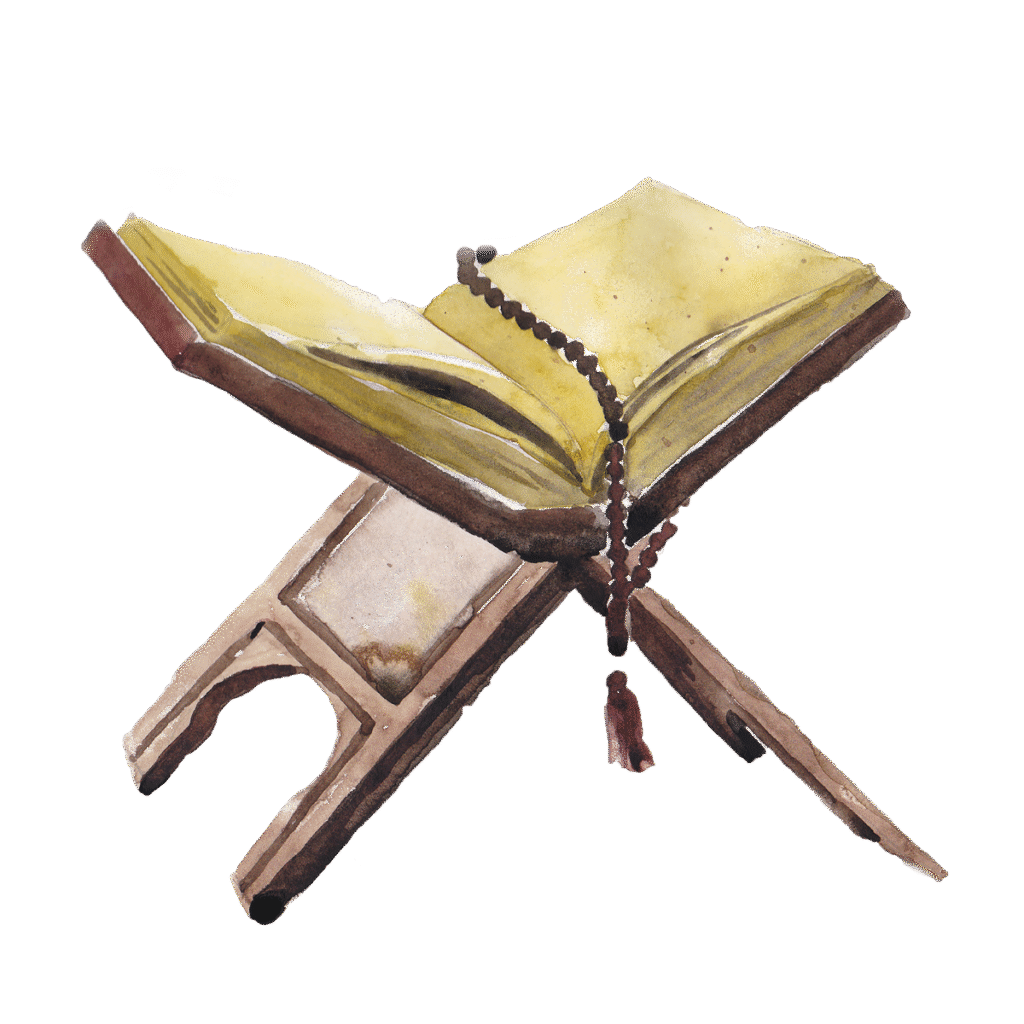Salah (prayer) is the most essential act of worship after the Shahada. It connects Muslims with Allah through regular, structured communication and is performed five times daily.
What is Salah?
Salah refers to the ritual prayers prescribed by Islam that are performed at specific times throughout the day. These prayers include physical movements, recitation of Qur’anic verses, and supplications.
Importance of Salah
- Direct Connection to Allah: Salah is an opportunity to speak directly to the Creator.
- Reminder of Faith: The regular timing ensures constant remembrance of Allah throughout the day.
- Spiritual Discipline: It instills a sense of accountability and structure.
- Key to Success: The Qur’an and Hadith emphasize Salah as a defining characteristic of a true believer.
Getting Started
Below are the 5 daily prayers, the general time of the day they are required to be prayed and how many rakaat (units of prayer) you need to do for each prayer. Please note:
🕰️ The exact time of when each prayer period begins/ends depends on where you live. Please look up your location online to find the exact times or consult your local Muslim community.
https://www.islamicfinder.org/prayer-times
The Five Daily Prayers
| Prayer | Arabic Name | Time of Day | Raka’at (Units) |
|---|---|---|---|
| Fajr | الفجر | Dawn (before sunrise) | 2 Fard, 2 Sunnah |
| Dhuhr | الظهر | Midday (after the sun passes its zenith) | 4 Fard, 4 Sunnah, 2 Sunnah |
| Asr | العصر | Afternoon | 4 Fard |
| Maghrib | المغرب | Sunset (after the sun has fully set) | 3 Fard, 2 Sunnah |
| Isha | العشاء | Night (after twilight ends) | 4 Fard, 2 Sunnah, 3 Witr |
Optional (Nafl) prayers can also be performed for additional blessings.
There are 3 main types of prayer:
- Fard – Obligatory, you have to pray these.
- Sunnah – Optional, but highly recommended (as this was the practice of our Prophet Muhammad pbuh)
- Witr – Optional (Sunnah Mu’akkadah) night prayer, that holds a special status in Islam. It is often referred to as the “odd-numbered” prayer because it consists of an odd number of rak’ahs (units of prayer), such as one, three, five, or more. Witr is typically performed after the Isha (night prayer).
Salah Tracker
You can consider getting a Salah tracker to help you keep track of your prayers and make it easier to turn prayer into a habit and part of your routine. This is a Salah tracker that I created and designed, by purchasing this you would be supporting my work and it would mean a lot!
Here’s one made especially for kids!
Link to Salah Tracker for Kids
Alternatively, you can just use a regular notebook to track your prayers too.
Starting Resources
Making Wudu
Wudu (ablution) is an essential preparation for Salah, ensuring both physical and spiritual cleanliness. Without wudu, Salah is invalid, as it symbolizes purity and readiness to stand before Allah.
Steps of Wudu
- Make Niyyah (Intention):
- Silently intend in your heart to perform wudu for the sake of Allah.
- Say “Bismillah” (In the Name of Allah).
- Wash Hands:
- Wash both hands up to the wrists three times, ensuring water reaches between the fingers.
- Rinse Mouth:
- Rinse the mouth three times, swirling the water to remove any impurities.
- Cleanse Nose:
- Inhale water into the nostrils gently and exhale it out three times.
- Wash Face:
- Wash the entire face from the hairline to the chin and ear to ear three times.
- Wash Arms:
- Wash the right arm first, then the left, from the fingertips to the elbows three times.
- Wipe Head:
- Wet your hands and wipe over the head once, from the front hairline to the back and back to the front.
- Clean Ears:
- Use your wet fingers to clean the inside and back of the ears.
- Wash Feet:
- Wash the right foot first, then the left, up to the ankles three times. Make sure water reaches between the toes.
Conditions That Break Wudu
Wudu becomes invalid in the following situations:
- Using the bathroom (urinating, defecating, or passing wind).
- Deep sleep (where one loses awareness).
- Bleeding (if it flows beyond the wound).
- Loss of consciousness (due to fainting or intoxication).
- Touching private parts without a barrier.
When wudu is invalidated, it must be renewed before performing Salah.
🧕🏽Menstruating women are not required to pray (as they cannot be in a state of wudu if they’re actively bleeding). Instead, they should take this time to rest. They’re not required to make up for these prayers either.
Where to face when praying?
Muslims face the Kaaba in Mecca, Saudi Arabia, when performing their prayers (Salah). This direction is called the Qibla.
Significance of Facing the Kaaba:
- Symbol of Unity: Facing the Kaaba symbolizes the unity of Muslims around the world as they turn their attention to a single focal point during prayer.
- Divine Command: The Qibla was established by Allah as a direction for prayer in the Qur’an: “So turn your face toward Al-Masjid Al-Haram (the Sacred Mosque). And wherever you [believers] are, turn your faces toward it.”(Surah Al-Baqarah, 2:144)
About the Kaaba:
The Kaaba is a cubical structure located within the Masjid al-Haram in Mecca. It is the most sacred site in Islam and is believed to have been originally built by Prophet Ibrahim (Abraham) and his son Prophet Ismail (Ishmael) as a house of worship dedicated to Allah.
Determining the Qibla:
- In Mosques: Most mosques have a mihrab, a niche in the wall indicating the Qibla direction.
- Using Technology: Muslims can use compasses, apps, or websites to determine the Qibla direction when outside a mosque or traveling.
- Estimating: If unsure, Muslims can estimate the Qibla based on their best judgment.
There are many apps you can download on your phone that will help you determine where the Qibla is.
Performing Salah
If you’re just starting out and don’t know Arabic, don’t worry, you can still start working on your Salah. Below are some videos where you can basically “pray alongside” the people in the video. Even if you don’t know Arabic, just put the video on, stand for prayer and you can stay silent and just listen to the recitation in the video while you follow along the movements.
Don’t be too hard on yourself. Islam is a journey and Allah does not care for results (as they don’t impact or effect him whatsoever), He cares for efforts. As long as you’re trying to learn how to perform Salah and slowly trying to learn the correct Arabic to pray Salah, you’re doing a great job and may Allah reward you immensely for your efforts.
Fajr Prayer
Dhuhr Prayer
Asr Prayer
Maghrib Prayer
Isha Prayer
Interactive Prayer Mat
You can also consider getting yourself an interactive prayer mat that will help you not only with the recitations but also the general flow and the order of movements during Salah. This is a great tool for reverts who are completely new to the concept of praying.
Dua: Conversations with your Creator
Dua is a beautiful way to connect with Allah. It’s your direct conversation with Him, where you can ask for guidance, strength, forgiveness, or anything you need. You don’t even need to ask for anything, you can just talk to Allah! Tell him about your day, about your wins and your losses, your hardships and your successes. Confide in him like you’d confide in your closest of friends, because that is what he should be to you; a friend. Like all relationships in life, building a bond requires genuine connection and spending time and your relationship with Allah is no exception. Allah listens to every prayer, and He is always ready to respond in the best way and at the perfect time.
Tips for Making Dua:
- Start with Praise: Begin by praising Allah and acknowledging His greatness.
- Ask for What You Need: Be sincere and ask for both the small and big things in life.
- Be Persistent: Keep making dua, trusting that Allah hears and answers.
- Trust His Timing: Sometimes, the response comes in ways you may not expect—trust Allah’s wisdom.
The Prophet Muhammad (peace be upon him) said:
“Dua is the essence of worship.” (Sunan al-Tirmidhi)
Keep making dua, knowing that every supplication is a step closer to Allah’s mercy and help. 💖
Dua Extended
If you’re looking for more knowledge on the power of dua, you can look at the following piece:
The Power of Dua: Conversations with your Creator
Verses and Hadith on Salah
Qur’an:
- “Indeed, prayer prohibits immorality and wrongdoing, and the remembrance of Allah is greater.” (Surah Al-Ankabut, 29:45)
- “Establish prayer and give zakah and bow with those who bow [in worship and obedience].” (Surah Al-Baqarah, 2:43)
Hadith:
- The Prophet Muhammad (peace be upon him) said:“The first deed for which a person will be called to account on the Day of Judgment will be his Salah.” (Sunan Abi Dawood)
- “Between a man and disbelief is abandoning the prayer.” (Sahih Muslim)
Challenges for Reverts and Tips
- Learning the Words and Movements:
- Start with learning the basic phrases of Salah in Arabic (e.g., Al-Fatiha and “Subhana Rabbiyal Adheem“).
- Use transliterations or prayer apps for support.
- Listen to recitations when you have time to help you familiarize yourself with the sounds. Sometimes you can even memorize what you need entirely from just listening to recitations enough times.
- Adjusting to the Schedule:
- Set alarms for the five daily prayers.
- Start small by praying one or two prayers consistently and gradually increase. It can be a big adjustment, especially if you’re not from a background of prayer. Take it easy on yourself and remind yourself that even a little progress is better than no progress. Focus on the fard prayers (obligatory prayers) and set yourself goals.
- E.g. Try to pray just Isha everyday as a starting point.
- Finding a Place to Pray:
- You can pray almost anywhere, as long as the space is clean. You don’t need a mat but it’s nice to have one.
- Carry a small prayer mat if needed.
💫Make prayer something enjoyable for yourself. Get yourself a prayer mat that you find beautiful and attractive and even consider buying yourself some new clothes (for women a new hijab) but make sure you genuinely like it (like the colour, the fabric, the feel etc.) Also try and dress up a little (not excessive) for prayer. Afterall, prayer is a meeting with Allah so why shouldn’t we bring our best selves forward?
When you’re praying, also consider making your atmosphere more calm and meditative (because in it’s essence, that is what prayer is). Then every time you have to pray, allow yourself to enjoy the process of getting ready, making wudu, getting dressed in your beautiful garments (cleanliness and modesty are the most important), using your beautiful prayer mat and being in a calm peaceful environment to take some time out of your busy day to remember your creator.
Prayer Mats
If you can, try and get your prayer mat from an Muslim-owned stored that is ethically produced. Obviously this isn’t a requirement but we should try (if we have the means) to support our fellow brothers and sisters.
Modefa
A family-owned business offering a wide selection of Turkish-made Islamic prayer rugs, including velvet, chenille, and woven mats. Modefa emphasizes quality and authenticity in their products.
RahatNook
Specializes in handcrafted Islamic lifestyle products, including woolen prayer rugs and prayer beads. Rahatnook focuses on natural materials and fair-made products, supporting small family manufacturers.
Etsy
There are many small businesses on Etsy that sell high-quality prayer mats. You’ll have to do a little research on the sellers if you want to meet any specific requirements but overall a great place with many affordable options.
Spiritual Benefits of Salah
- Inner Peace: Salah helps reduce stress and brings a sense of tranquillity.
- Guidance: Regular prayers remind us of our purpose and keep us connected to Allah.
- Accountability: It instills mindfulness about one’s actions throughout the day.
Starting your journey with Salah and wudu is a beautiful and transformative step, and Allah knows the effort you’re putting in. It’s important to remember that the journey isn’t about being perfect—it’s about showing up, doing your best, and making the sincere effort to connect with Allah. Every time you prepare for prayer, you’re strengthening your bond with your Creator, and that’s something to be proud of.
The Prophet Muhammad (peace be upon him) reminded us:
“The reward of deeds depends upon the intentions, and every person shall get the reward according to what he has intended.” (Sahih Bukhari)
Every step you take, even if it feels small or imperfect, brings you closer to Allah. The effort you’re putting in, no matter how challenging it may feel at times, is valued and will be rewarded.
No matter how small your efforts feel, Allah rewards every act of worship done with a pure heart. It doesn’t matter if you’re still learning or if you make mistakes; what matters is that you are trying. Every time you stand to pray, you are turning to Allah, asking for His guidance, and seeking His closeness. That is the essence of worship.
Remember that Allah is merciful and understanding. He does not expect perfection but values the intention and the effort. So, if you miss a prayer or find it difficult at times, don’t give up. Keep trying, keep making the effort, and know that each prayer you offer is a step closer to Allah’s love and mercy.
“Allah does not burden a soul beyond that it can bear.” (Surah Al-Baqarah, 2:286)
Every moment of Salah is an opportunity for you to speak directly to Allah, to seek His forgiveness, and to strengthen your connection with Him. Keep going, take it one prayer at a time, and trust that your efforts are seen and cherished by Allah. You’re doing an amazing job, and He is with you every step of the way. 💖



